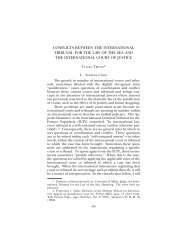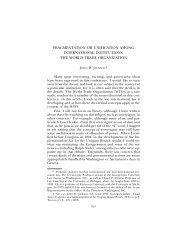some concluding remarks - Project on International Courts and ...
some concluding remarks - Project on International Courts and ...
some concluding remarks - Project on International Courts and ...
Create successful ePaper yourself
Turn your PDF publications into a flip-book with our unique Google optimized e-Paper software.
1999] CONCLUDING REMARKS 921C. Diversity of Tribunals <strong>and</strong> Unity of the Judicial SystemWhat these judicial organs have in comm<strong>on</strong>, in spite oftheir diversity, is that they bel<strong>on</strong>g to the same legal system <strong>and</strong>derive their legitimacy <strong>and</strong> physiognomy from it. Together,they discharge, in that particular order, <strong>on</strong>e of the essentialfuncti<strong>on</strong>s of any legal order, namely, the judicial or adjudicativefuncti<strong>on</strong>. They thus c<strong>on</strong>stitute what is called in municipallaw, at least in civil law jurisdicti<strong>on</strong>s, the “judicial system”within the legal order. This c<strong>on</strong>cept is the depicti<strong>on</strong> or representati<strong>on</strong>of the “c<strong>on</strong>stellati<strong>on</strong>” of courts <strong>and</strong> tribunals withinthe legal order, a “c<strong>on</strong>stellati<strong>on</strong>” that is, by definiti<strong>on</strong>, correlated.Even the most independent tribunals within the legalorder, e.g., military tribunals, are defined, in their role <strong>and</strong> theambit of their jurisdicti<strong>on</strong>, in terms of their relati<strong>on</strong> to the regularcourts structure.II.THE SPECIFICITY OF INTERNATIONAL LAWHow do these three propositi<strong>on</strong>s apply to internati<strong>on</strong>allaw? I do not think the first two raise any problems, unlike thethird, for we do not seem to have a “judicial system,” properlyso-called, in internati<strong>on</strong>al law. Why is this the case?This year of grace 1998 marks the 350th anniversary ofthe Peace of Westphalia, which is comm<strong>on</strong>ly c<strong>on</strong>sidered to bethe turning point in the transmutati<strong>on</strong> of the internati<strong>on</strong>allegal order from a hierarchical to a horiz<strong>on</strong>tal structure.While this representati<strong>on</strong> is an obvious simplificati<strong>on</strong>, there is<str<strong>on</strong>g>some</str<strong>on</strong>g> truth to it, as being that of the historical event markingthe vindicati<strong>on</strong> <strong>and</strong> generalizati<strong>on</strong> of the maxim ejus regio,cujus religio; that is, the formulati<strong>on</strong>, in the ideological languageof the time, of the principle of sovereign equality, accordingto which the prince or the sovereign has the last word,or is the last instance of decisi<strong>on</strong>-making at the internati<strong>on</strong>allevel.Having repudiated hierarchical links, sovereigns did notwish to reinstate new instances above themselves that couldbind them without their c<strong>on</strong>sent, even in the form of tribunals.Thus, for about two centuries, internati<strong>on</strong>al adjudicati<strong>on</strong>in the real sense fell in abeyance. The Pope was no l<strong>on</strong>gerc<strong>on</strong>sidered the final arbiter, while most of the few cases thatwere chr<strong>on</strong>icled as arbitrati<strong>on</strong>s were references by sovereignsin dispute to a third sovereign, as an egalitarian way of seeking






